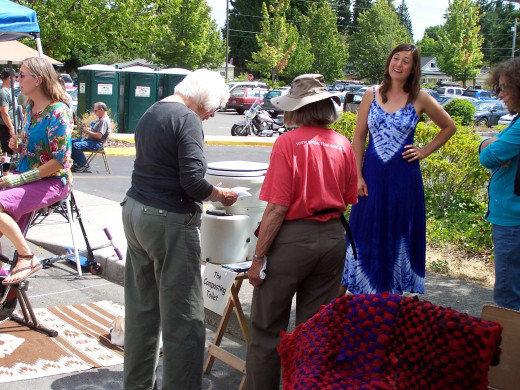The Writer's Mailbag: Installment Twenty-Nine
The Mailbag Is Full This Week
Thanks to one person in particular, this is a full installment this week. I’m sitting down a day after my Seattle Seahawks delivered a whoopin’ on Carolina, so I’m smiling and quite pleased with life.
In case you are new to the Mailbag, you ask the questions and I supply the answers as best I can. If I don’t know the answer I’ll either refer you to someone else or I’ll do some research before I answer. For questions asking for my opinion remember, please, that it is simply my opinion. Writing, in many ways, is a purely individual undertaking, and what is true for me may not be true for you.
With all that out of the way, let’s get started, shall we?

Quotation Marks
From Brad: “Now, my next question is about double quotes at the end of a sentence. What is the rule of grammar for where the period is placed in that kind of sentence?”
As a general rule, the punctuation goes inside of the quotation marks, Brad. Here’s an example….
“Are you going out?” he said.
Also, use single quotation marks when there is a quote inside of a quote. If my character is speaking to someone like in the following example:
“I was talking to the clerk and he said, ‘you can’t take it without paying for it,’ and I was shocked he thought I would steal it.”
There are other rules as well, but that covers the two that we most often have to consider when writing fiction.
OUTLINING
From Iris: “You mentioned that you practice free-flow writing often. You've mentioned in other articles that you form an outline for your novels. Do you find that when you begin to flesh in your novel and your writing starts to flow that your outline changes, or do you stay within the confines of your original line of thinking?”
Great question, Iris, but I fear I may have given you the wrong impression. The only outline I do is in my head when I’m writing a novel. I usually begin with an introduction and a general idea of a story. I then determine how I want the story to end.
Knowing that I must provide a spark every 25,000 words, I then determine four main events that will happen (the sparks) that will propel the story…and then I just start writing. I should mention that I also write a biography of my main characters before I begin.
The actual writing of the book, though, is done without a formal outline. I do not recommend this for all writers, but it does work well for me.

What Age Group?
From Brad again: “Seriously, my question is at what age group should your writing be directed, say in the case of an adult mystery?”
This seems like such a simplistic question at first glance, but it really is something worth considering before you sit down to write a short story or novel. Who are you writing for? What is your target audience? You need to consider that carefully before you go too far.
The other problem is that within your target audience is a wide range of learning levels. I can say I’m writing to the 25-50 age group, but within that age group is quite an array of intellectual levels. I, personally, do not believe in writing down to the lowest level, so I try to write to the middle of that intellectual grouping. Being too erudite will lose the lower three-fourths. Being too simplistic will bore the upper-fourth.
Does that make sense?

VERNACULAR
Another question from Brad:
“In writing scene, Alancaster149 made a comment that using the vernacular didn't work all the time, but I thought average language was appropriate for the piece. She as mentioned in your hub doesn't have enough context for me to know whether it was appropriate to use the way people talk. When people talk, they are fast and loose with grammar, and repetition of words falls like raindrops in a heavy shower.
So maybe in a future hub, you can give the pro and con of using the vernacular.
In addition, he also suggested dropping the -ing.
I really don't understand either of these comments, as I don't know much about writing fiction. That doesn't mean that I don't want to learn more about it.”
Thanks, Brad! I might add that Brad has never written fiction. He’s a nonfiction kind of guy, but he is a curious sort who wants to learn, and I love that about him.
As for his first question, the answer is a bit tricky. When we develop characters, we want them to sound lifelike and real so yes, we want to change their speech patterns and their vernacular to distinguish one from the other. The main problem, as I see it, is when an author plays fast and loose with the language. If I’m writing a short story, I don’t want my writing to reach “street level,” but there may be times when I want one of my characters to do so.
The second part of Brad’s question refers to passive vs active voice, and it is something I am constantly aware of since I have a nasty habit of slipping into passive voice.
In a sentence with active voice, the subject of the sentence comes before the verb, and the object of the sentence come after the verb. “The dog ate his food” is an example of active voice because the dog is the subject, he comes before the verb, and the object, food, comes after the verb.
The same sentence written in passive voice would look a bit different. “The food was eaten by the dog,” is an example of passive voice. The subject and the object are the same, but in this case the object came before the verb.
I can hear some of you saying, “WHO CARES?” and I understand you to a certain extent…but….
For the most part, “passive voice” writing is wordier, and writing instructors warn against unnecessary wordiness. Also, beginning with the subject sounds more direct and dramatic. Thirdly, passive voice construction raises issues of accountability and can be confusing.
I hope that helps, Brad. I could actually write an entire article about active vs passive, and maybe I will in a few weeks.
The Ebook Rants of Bill Holland
From Nancy: “You seem to be a bit down on the ebook industry. Can you tell me why?”
Okay, you asked for it, Nancy, so boy oh boy, are you ever going to get it.
The good news is that anyone can publish a book because of the ebook industry. The bad news is that anyone can publish a book.
My concern is that the literary field is getting watered down by too much production. Think of it like Supply and Demand. If too much of a product is made, eventually the price will go down for that product. In my view, too many ebooks are being published, and that detracts from the “value” of those books.
I hold the art of writing at a very high level of admiration. It is a craft, and that means it should represent excellence. I think it’s kind of wonderful that some grandfather in Topeka can write his memoirs about life on a wheat farm, but if his writing skills are negligible, then how does that raise the bar in literature?
There were more books written last year, 2014, than ever before in the history of the world, and yet the average monetary return on each book was lower than at any time in history. In other words, because of ebooks, everyone wins and everyone loses.
Join me on my writing blog
- William Holland | Helping Writers to Spread Their Wings and Fly
Tips, discussions and reflections about writing
More Next Week
Heck, as long as Brad keeps following this series, I’ll always have something to write about. Just kidding, Brad. I greatly appreciate the questions, from Brad and the others, so keep them coming and I’ll keep those answers coming as well.
Have a marvelous week of writing and I’ll see you down the road.
2015 William D. Holland (aka billybuc)
“Helping writers to spread their wings and fly.”



![Rescuing His Heart [Wolves of Desire 13] (Siren Publishing The Lynn Hagen ManLove Collection)](https://m.media-amazon.com/images/I/51gIFajeIuL._SL160_.jpg)







